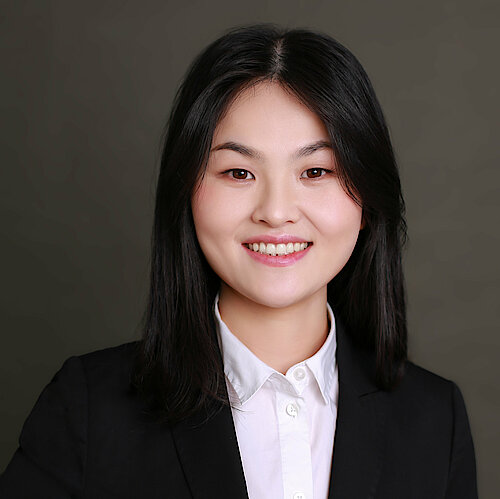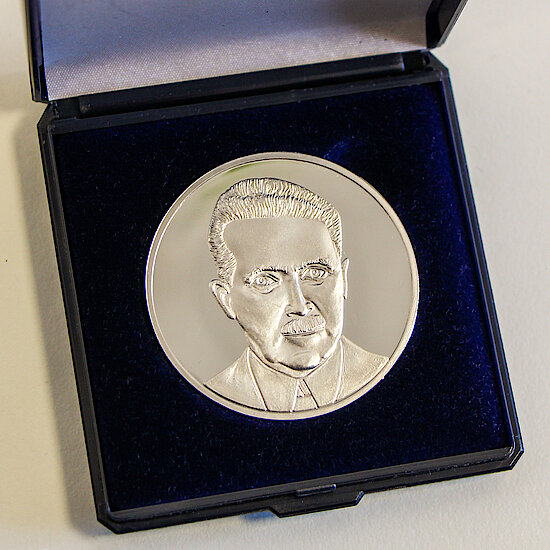Masing-Gedächtnispreis 2022
from Prof. Dr. Dierk Raabe
Dr. Huan Zhao received her Master Degree in Material Science and Engineering in 2015 at Chongqing University in China. In 2013, she was a visiting scholar at the Norwegian University of Science and Technology. She then came to Germany and joined the Max Planck Institut für Eisenforschung for her doctoral study in September 2015. She completed her doctorate in 2019 and has since continued to develop her research activities at the Max-Planck-Institut für Eisenforschung. During her PhD and beyond, during her postdoc project, Dr. Zhao and I worked closely together, particularly on questions related to advanced correlative atom probe tomography, nano-precipitates, precipitation free zones and hydrogen embrittlement of advanced aluminium alloys. I could wisdom her steady and strong development, becomin a young leader in our field. Over these years I have been highly impressed by her scientific progress, driven by curiosity and passion for basic scientific research.

Her wider scientific activities focus on the understanding of process-microstructure-property relationships. She masters the very complex details and the intricate interplay of several advanced high-resolution characterization techniques such as electron microscopy and atom probe tomography, and at the same time, has a very good command of the theoretical concepts that are involved in her research topics. The publication track record of Dr. Zhao is very impressive considering her career stage, but beyond the bibliometric figures, several of Dr. Zhao’s papers have made a very high impact in the aluminium-alloy research community. Huan most impactful publications are concerned primarily with high-strength aluminium alloys, which are widely used in the aerospace and vehicle sectors, However, the longevity and safety particularly of high strength aluminium alloys in service can be affected by embrittlement and limited corrosion resistance. Her research highlights the interplay between lattice defects and the nano-chemistry at these defects, which is not only of great fundamental importance but also stands at the core of these industrial challenges. Particularly, her works on the understanding of grain boundary segregation and precipitation behavior during aging [Zhao et al., Acta Materialia, 156, 318-329, 2018] and her study on the interplay of chemistry and structure at grain boundaries in high strength 7xxx Al-alloys [Zhao et al., Physical Review Letter, 124 106102, 2020.] point out the complexity of solute segregation to grain boundaries and their relation to the materials’ properties.
Another important work that Ms. Zhao carried out is on the understanding of hydrogen trapping and embrittlement in high-strength Al alloys. Hydrogen, the lightest element, is extremely mobile and is known to accumulate inside metals and render them brittle. Dr Zhao made use of our dedicated cryo-transfer atom probe tomography and revealed the trapping sites of hydrogen at grain boundaries in Al-alloys for the first time, and particularly also their interplay with the preceding Mg decoration, which presents a significant advance in the understanding of hydrogen-assisted embrittlement and provides access to potential strategies to mitigate hydrogen embrittlement in engineering Al-alloys. She published the work in Nature. [Zhao et al. Nature, 602, 437-441, 2022].

Huan’s early success has been acknowledged by the Acta Student Award from the board of governors for the paper published in Scripta Materialia. She has been honored with the Early Career Researcher Award at the 17th International Conference on Aluminum Alloys, and the TMS Light Metals Subject Award – Aluminum Alloys in 2020. The scientific performance of Dr. Zhao is impressive resulting in 27 publications, with 7 as the first author in top-ranked journals in physical metallurgy. Furthermore, she is involved in many scientific activities, for example as an invited speaker and as a reviewer. She also represents our institute in a large number of collaborations, including the University of British Columbia, the University of Manchester, and the University of Grenoble Alpes.
With her exceptional expertise in the use of advanced experimental methods, she has made several scientific breakthroughs in the field of aluminium-alloys. The Masing Memorial Award recognizes her exiting research, that is both of highest fundamental and applied relevance. I am extremely happy that Dr. Huan Zhao was chosen for the Masing Gedächtnispreis 2022 by the DGM and believe that she highly deserves this prestigious award.
DGM-Tag 2022
26.09.2022 in Darmstadt und online
DGM-Tag 2022
26.09.2022 in Darmstadt und online
Newsletter abonnieren
Abonnieren Sie unseren Newsletter und erhalten Sie regelmäßig Informationen zum Thema Materialwissenschaft und Werkstofftechnik!
Nach der Anmeldung erhalten Sie von uns eine E-Mail mit einem
Bestätigungslink.
Erst mit Anklicken dieses Links ist Ihre Anmeldung abgeschlossen.

